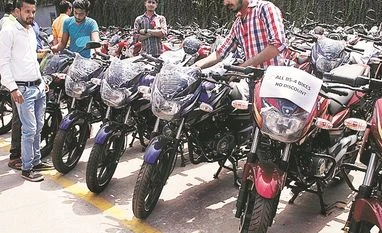The major chunk of the loss is expected to be borne by the Original Equipment Makers (OEMS) even as retro-fitment of the unsold vehicles to make them BS IV-compliant is also an alternative, the report by ratings firm Icra said on Monday.
The apex court on March 29 banned the sale and registration of BS-III category vehicles or those not compliant with Bharat Stage IV (BS IV) emission norms from April 1. The step was taken due to concerns on vehicular emission.
Also Read
The BS norms are emission standards imposed on automobile manufacturers which specify the maximum permissible limits for pollutants in the exhaust fumes of automobiles.
"The total loss for the two-wheeler industry on account of the discounts offered during March 30-31, 2017 is estimated to be around Rs 600 crore, sizeable share of which would be borne by the OEMs," Senior Group Vice-President at ICRA Subrata Ray said in the report.
BS IV emission norms, while tightening the emission limits on existing pollutants, also introduced limits on additional pollutants like nitrogen oxides.
The Supreme Court ban triggered heavy discounts across the country as auto dealers, including those selling two-wheelers, looked to clear stocks.
As many as 6.71 lakh two-wheelers, out of over 8 lakh BS-III vehicles, were impacted by the ban. The dealers tried to clear the BS-III inventory as fast as possible by offering massive discounts.
"The resultant discount-induced fire-sales are likely to suppress the fourth-quarter earnings of automobile OEMs, and in particular two-wheeler OEMs," Icra said.
ICRA also estimates that the costs associated with the heavy discounting during the March 30-31 period would have a 150-165 bps impact on the operating profitability of two- wheeler OEMs during the fourth quarter of the last fiscal.
India, which had been following the BS III emission regime from 2010, shifted to BS IV norms for all new two- wheelers from April 1, 2016 and was required to do so for all existing vehicles from April 1, 2017.
The major change in a two-wheeler on migration to BS IV norms would be the inclusion of carbon canisters to control evaporative emissions, the report said.
The other changes like tightening on limits of different pollutants would be met through optimisation of the combustion process and increasing the volume and surface area of catalyst used in the catalytic converter, it added.
)